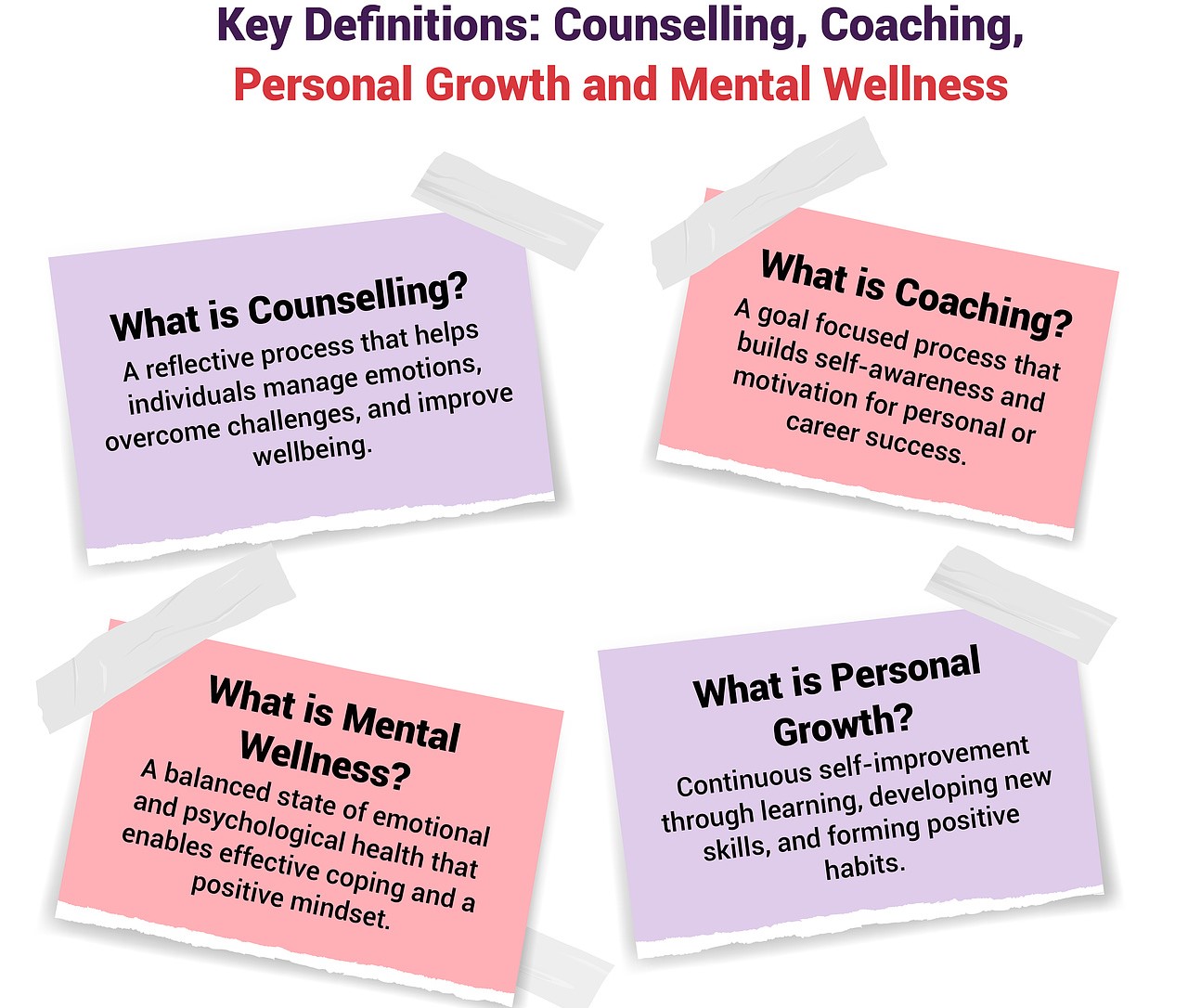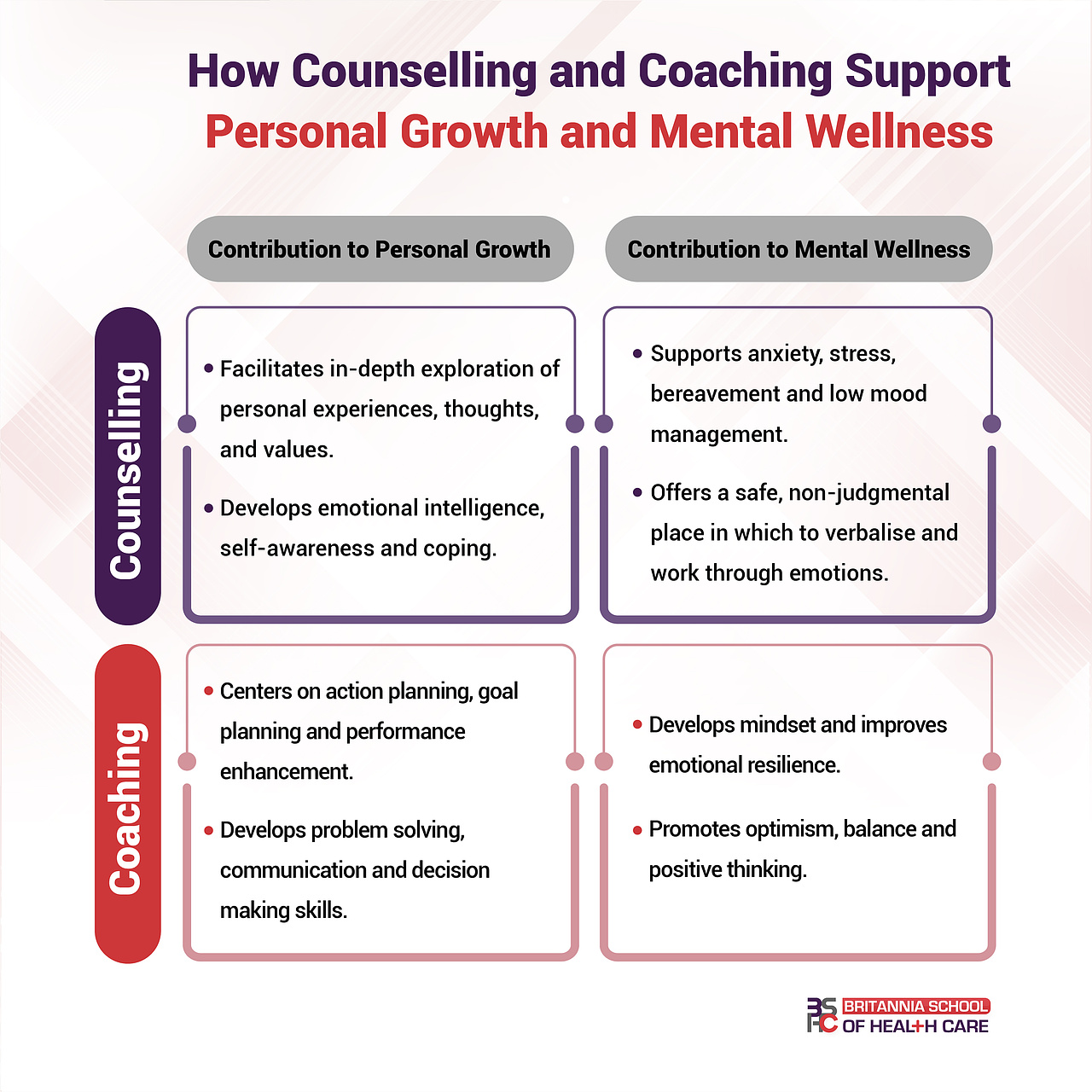Counselling and coaching are two complementary but different practices that are both vital to personal growth and to mental wellness. According to the BACP’s annual Public Perceptions Survey, up to 25% of 16–25-year-olds and 35% of UK adults have visited a counsellor or psychotherapist. The United Kingdom is the most robust market in Western Europe, with an estimated 370,000 coaching professionals with LinkedIn profiles. Mental illness is quite common and can affect your well-being in a variety of ways. According to current data, one in four adults in England are expected to experience at least one mental health issue in a given year.
Coaching and counselling share the same objectives of empowering and informing individuals. Through the reflective process of counselling or the goal technique of coaching, individuals gain practical knowledge and skills to enhance their mental health and ultimately empowering personal growth. This blog will highlight key facts and information that illustrate the value of coaching and counselling for mental health and personal growth.

What Is the Role of Counselling in Mental Health?
Counselling has an important role in providing mental health care because it provides people with a secure and confidential space to share their thoughts and emotions. It helps them deal with anxiety, grief, relationship problems and low self-worth. A trained counsellor guides clients to see why they feel distress, teaches ways to cope plus strengthens their ability to face later problems. Counselling provides consistent emotional support, not merely immediate comfort, much like how regular exercise keeps the body in shape.
The Key Roles of Counselling in Mental Health:
🧠 Emotional Healing: Assists people in processing painful experiences and emotions.
💭 Self-Awareness: Encourages understanding of thoughts, feelings, and behaviours.
😌 Stress Management: Provides tools to handle pressure and emotional overwhelm.
👥 Improved Relationships: Fosters empathy, communication, and self-acceptance.
🛡️ Prevention: Early intervention through counselling can prevent mental health issues from worsening.
What Is the Definition of Personal Development in Counselling?
In the field of counselling, personal development is defined as an ongoing process in which clients notice, study and revise their own thoughts, feelings plus actions. It is all about evolving into the finest version of yourself in terms of emotions, mindset, and social interactions. Personal growth through counselling involves a journey of learning, healing, and transformation, allowing you to gain a deeper understanding of your identity and aspirations. This journey fosters enhanced self-acceptance, boosts confidence, and cultivates emotional intelligence.
How Counselling Encourages Personal Development?
Following are the ways through which counselling encourages personal development:
- Helps individuals identify personal values and goals.
- Promotes empathy and understanding towards self and others.
- Encourages emotional regulation and resilience.
- Develops better decision-making and problem-solving abilities.

Why Is Mental Coaching Important?
Mental Coaching is important for individuals aiming to boost their concentration, drive, or effectiveness in various areas such as their careers, relationships, or personal aspirations. A mental coach guides individuals in confronting negative thought processes, building resilience, and fostering a mindset focused on growth and positivity. Mental coaching connects ideas with execution turning possibilities into tangible, lasting development.
Benefits of Mental Coaching:
- Encourages positive thinking and goal-oriented habits.
- Improves emotional regulation and response to stress.
- Promotes balance between wellbeing and achievement.
Why Coaching and Counselling Are Important?
The combined use of coaching and counselling offers a comprehensive solution for psychological well-being and personality enhancement, combining emotional healing with career advancement.
Counselling and coaching use different methods, yet each supports growth, recovery but also balance.
– Counselling targets emotional repair. It examines the past and handles feelings that shape present wellbeing.
– Coaching targets change – it sets goals as well as builds drive for the future.
When combined, the two form a complete route to health – counselling repairs the damage and coaching propels the next step.
Shared Benefits of Both:
- Improved self-awareness and confidence
- Greater emotional clarity and balance
- Better communication and relationships
- Motivation to make positive life changes
- A stronger sense of direction and purpose
Together, counselling and coaching create a complete support system for emotional healing and sustained mental wellness.
Conclusion: The Power of Combining Counselling and Coaching for Lasting Growth and Mental Wellness
By bringing together counselling and coaching, people can grow as a whole. This integrated process recognises that growth and mental wellness go hand in hand. Counselling fixes the internal emotional blocks, and coaching takes this as a platform to drive people towards their dreams. It makes sure success is achieved and individuals are able to withstand failure in the future. This blend provides an even process, wherein emotional restoration and goal realisation are being worked on simultaneously, resulting in deeper and sustained change.
In doing so, people are able to live more meaningful and well-balanced lives with greater self-awareness and direction. This synergy ultimately drives overall mental well-being and further personal growth.

